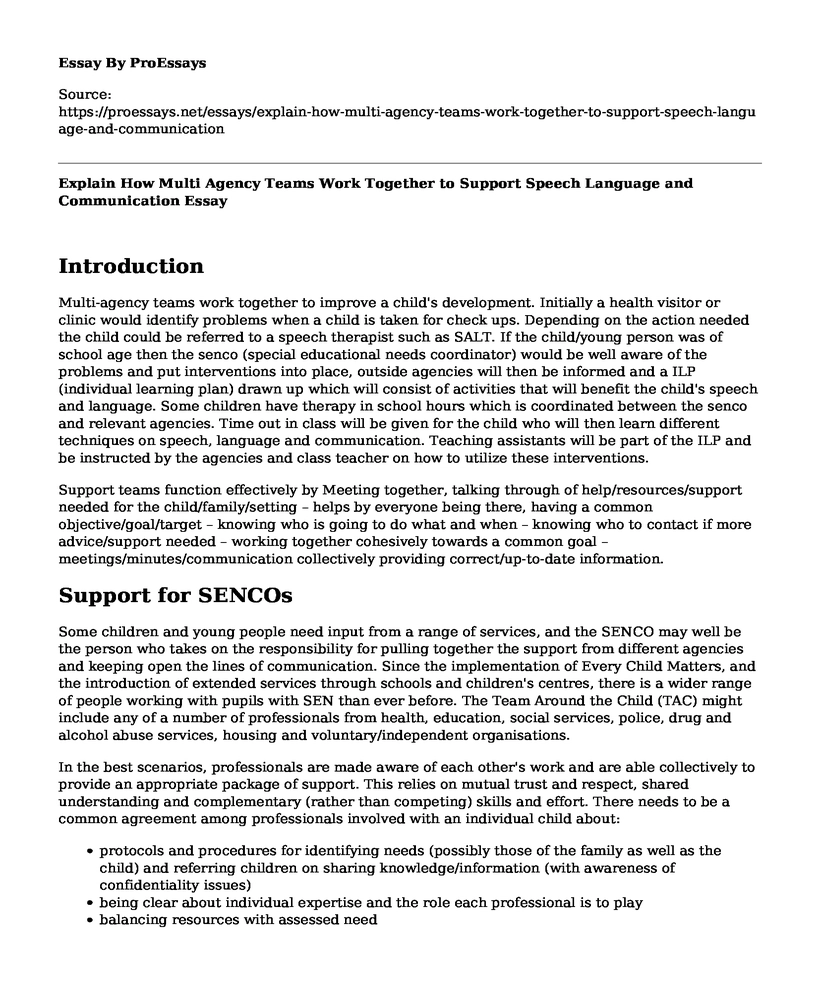Introduction
Multi-agency teams work together to improve a child's development. Initially a health visitor or clinic would identify problems when a child is taken for check ups. Depending on the action needed the child could be referred to a speech therapist such as SALT. If the child/young person was of school age then the senco (special educational needs coordinator) would be well aware of the problems and put interventions into place, outside agencies will then be informed and a ILP (individual learning plan) drawn up which will consist of activities that will benefit the child's speech and language. Some children have therapy in school hours which is coordinated between the senco and relevant agencies. Time out in class will be given for the child who will then learn different techniques on speech, language and communication. Teaching assistants will be part of the ILP and be instructed by the agencies and class teacher on how to utilize these interventions.
Support teams function effectively by Meeting together, talking through of help/resources/support needed for the child/family/setting – helps by everyone being there, having a common objective/goal/target – knowing who is going to do what and when – knowing who to contact if more advice/support needed – working together cohesively towards a common goal – meetings/minutes/communication collectively providing correct/up-to-date information.
Support for SENCOs
Some children and young people need input from a range of services, and the SENCO may well be the person who takes on the responsibility for pulling together the support from different agencies and keeping open the lines of communication. Since the implementation of Every Child Matters, and the introduction of extended services through schools and children's centres, there is a wider range of people working with pupils with SEN than ever before. The Team Around the Child (TAC) might include any of a number of professionals from health, education, social services, police, drug and alcohol abuse services, housing and voluntary/independent organisations.
In the best scenarios, professionals are made aware of each other's work and are able collectively to provide an appropriate package of support. This relies on mutual trust and respect, shared understanding and complementary (rather than competing) skills and effort. There needs to be a common agreement among professionals involved with an individual child about:
- protocols and procedures for identifying needs (possibly those of the family as well as the child) and referring children on sharing knowledge/information (with awareness of confidentiality issues)
- being clear about individual expertise and the role each professional is to play
- balancing resources with assessed need
- working towards the same goals
- understanding services, duties and limitations (including finances).
The SENCO will be responsible for arranging assessments and collating assessment information, organising and running meetings and putting together a joint agency plan. Such a plan should:
- clearly set out the outcomes to be achieved for the child/young person (and possibly the family)
- define the accountabilities of everyone involved: who will do what, when and where (with costs)
- detail the processes of evaluation: how will you know if it's working set out the arrangements for review.
Cite this page
Explain How Multi Agency Teams Work Together to Support Speech Language and Communication. (2022, Jul 28). Retrieved from https://proessays.net/essays/explain-how-multi-agency-teams-work-together-to-support-speech-language-and-communication
If you are the original author of this essay and no longer wish to have it published on the ProEssays website, please click below to request its removal:
- Managing Classroom Challenges Paper Example
- Anti-Bullying Essay Example
- How Parents Can Promote Good Reading Habits in Their Children Essay
- Paper Example on Observing Preschool Class & Babysitting: A Fun & Rewarding Experience
- School Property Tax Debate Reaches PA: Argall's Tax Shift Plan Criticized - Essay Sample
- Key Aspects of Early Childhood Development - Free Report Exampe
- Summary of Strengths - Essay Example







